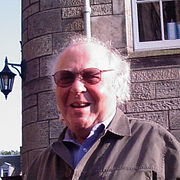- Marshall Sahlins
-
Marshall Sahlins 
Born December 27, 1930
Chicago, Illinois, United StatesCitizenship American Fields Anthropology Institutions University of Chicago Alma mater University of Michigan
Columbia UniversityMarshall David Sahlins (born December 27, 1930, Chicago, Illinois) is a prominent American anthropologist. He received both a Bachelors and Masters degree at the University of Michigan where he studied with Leslie White, and earned his Ph.D. at Columbia University in 1954 where his main intellectual influences included Karl Polanyi and Julian Steward. He returned to teach at the University of Michigan and in the 1960s became politically active, protesting against the Vietnam War. In 1968, he signed the “Writers and Editors War Tax Protest” pledge, vowing to refuse tax payments in protest against the Vietnam War.[1] In the late 1960s he also spent two years in Paris, where he was exposed to French intellectual life (and particularly the work of Claude Lévi-Strauss) and the student protests of May 1968. In 1973 he moved to the University of Chicago, where he is today the Charles F. Grey Distinguished Service Professor of Anthropology Emeritus. His brother is the writer and comedian Bernard Sahlins.
Contents
Work
Sahlins' work has focused on demonstrating the power that culture has to shape people's perceptions and actions. He has been particularly concerned to demonstrate that culture has a unique power to motivate people that is not derived from biology. His early work focused on criticising the idea of 'economically rational man' and to demonstrate that economic systems adapted to particular circumstances in culturally specific ways. After the publication of Culture and Practical Reason in 1976 his focus shifted to the relation between history and anthropology, and the way different cultures understand and make history. Although his focus has been the entire Pacific, Sahlins has done most of his research in Fiji and Hawaii.
“The world’s most ‘primitive’ people have few possessions, but they are not poor. Poverty is not a certain small amount of goods, nor is it just a relation between means and ends; above all it is a relation between people. Poverty is a social status. As such it is the invention of civilisation. It has grown with civilisation, at once as an invidious distinction between classes and more importantly as a tributary relation.”
Sahlins (1972)[2]In his Evolution and Culture (1960) he touched the areas of cultural evolution and neoevolutionism. He divided the evolution of societies into 'general' and 'specific'. General evolution is the tendency of cultural and social systems to increase in complexity, organization and adaptiveness to environment. However, as the various cultures are not isolated, there is interaction and a diffusion of their qualities (like technological inventions). This leads cultures to develop in different ways (specific evolution), as various elements are introduced to them in different combinations and on different stages of evolution.
In the late 1990s Sahlins became embroiled in a heated debate with Gananath Obeyesekere over the details of Captain James Cook's death in the Hawaiian Islands in 1779. At the heart of the debate was how to understand the rationality of indigenous people. Obeyesekere insisted that indigenous people thought in essentially the same way as Westerners and was concerned that any argument otherwise would paint them as 'irrational' and 'uncivilized'. Sahlins, on the other hand, was critical of Western thought and argued that indigenous cultures were distinct from those of the West.
In 2001, Marshall Sahlins became the executive publisher of a small press called Prickly Paradigm.
See also
Publications
- Social Stratification in Polynesia (1958)
- Evolution and Culture (ed., 1960)
- Moala: Culture and Nature on a Fijian Island (1962)
- Tribesmen (1968)
- Stone Age Economics (1974: ISBN 0422745308)
- The Use and Abuse of Biology (1976: ISBN 0472087770)
- Culture and Practical Reason University of Chicago Press (1976: ISBN 0226733599)
- Historical Metaphors and Mythical Realities (1981: ISBN 0472027212)
- Islands of History (1985: ISBN 0226733572)
- Anahulu: The Anthropology of History in the Kingdom of Hawaii (1992: ISBN 0226733637)
- How "Natives" Think: About Captain Cook, for Example University of Chicago Press (1995: ISBN 0-226-73368-8)
- Waiting For Foucault (1999: ISBN 1891754114)
- Culture in Practice (2000: ISBN 094229937X)
- Apologies to Thucydides: Understanding History as Culture and Vice Versa University of Chicago Press (2004: ISBN 0226734005)
- The Western Illusion of Human Nature (2008: ISBN 13-9780979405723)
References
- ^ “Writers and Editors War Tax Protest” January 30, 1968 New York Post
- ^ Sahlins, Marshall. (1972). The Original Affluent Society. A short essay at P.129 in: Delaney, Carol Lowery. P110-P.133. Investigating culture: an experiential introduction to anthropology. Oxford : Blackwell, 2004. ISBN 0631222375.
External links
- The Original Affluent Society - the seminal article by Marshall Sahlins
- Faculty Page - from the University of Chicago Department of Anthropology web site
- http://www.mnsu.edu/emuseum/information/biography/pqrst/sahlins_marshall.html
- Waiting for Foucault, Still A small, pocket-sized book by Sahlins. Published in 2002 by Prickly Paradigm, now available for free online(in pdf).
- Marshall Sahlins, Poor Man, Rich Man, Big Man, Chief; Political Types in Melanesia and Polynesia, In: Comparative Studies in Society and History, vol. 5, No.3, pp.285-303, April 1963.
- On the anthropology of Levi-Strauss
About the controversy with Obeyesekere (See also Death of Cook article, about the 2004 re-discovery of the original painting of the incident by John Cleveley the Younger, showing a less idealised Cook):
Categories:- 1930 births
- Members of the United States National Academy of Sciences
- Living people
- American anthropologists
- American tax resisters
- University of Chicago faculty
- University of Michigan alumni
- Columbia University alumni
Wikimedia Foundation. 2010.
